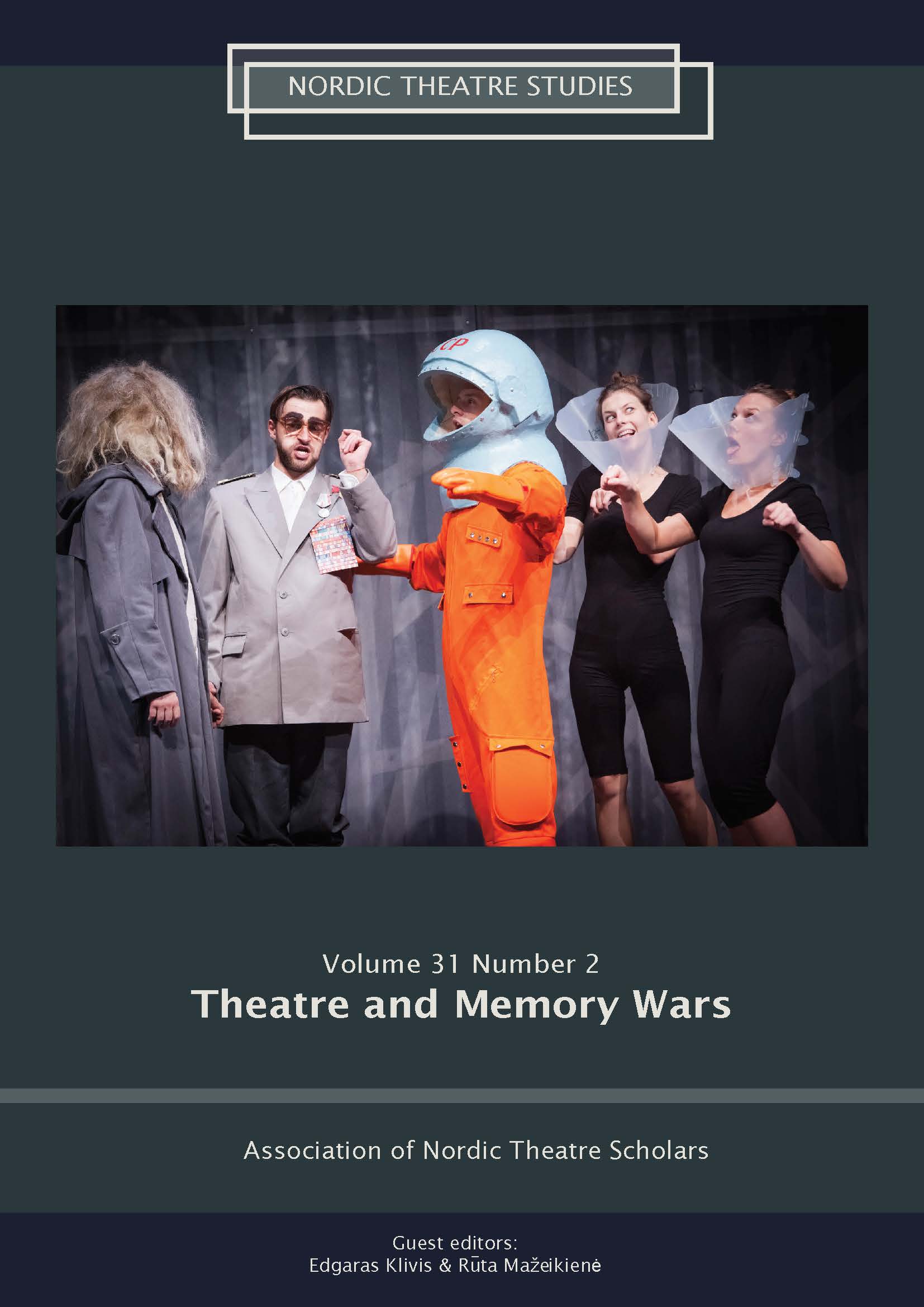Performing Memoria
A Theatre Performance Giving Voice to Speechless Memories
DOI:
https://doi.org/10.7146/nts.v31i2.120117Keywords:
Holocaust narratives, New documentary, Trauma, Amnesia, Oblivion, Performance, Artistic memories, Legacy of silenced victims, Medialization of death-life on stage, Else Marie Laukvik, Odin TeatretAbstract
Odin Teatret’s Memoria (1990) centres round an actor’s conflict with the act of remembering. In this article, however, one strand follows Giorgio Agamben’s presentation of “remnants of Auschwitz”, which is based on the story of Hasidic children’s experience of surviving World War II, and how for some survivors, the guilt of surviving while others perished is too great a burden to bear, so much so that suicide seems their only route to peace. A further strand builds on Rebecca Schneider’s ideas about the very act of re-enacting remembrance as a performance, which remains once all living memories of historical facts are gone. On a more specific level, Memoria brings together the narrative of the Hasidic Tales of the Holocaust (1983) with memories from philosophers such as Primo Levi and Jean Améry, with Else Marie Laukvik and Frans Winther giving voice to these speechless memories. Laukvik, who is the author of the Memoria script, also manages to embody the conflict that can arise from remembering in her performance. The article is based on watching Memoria, as well as archive materials, personal interviews, and other performances by Else Marie Laukvik, who is also the author of the Memoria script.
References
Agamben, Gsiorgio. 1999. Remnants of Auschwitz: The witness and the archive, Homo Sacer ; 3. New York: Zone.
Améry, Jean. 1977. Jenseits von Schuld und Sühne. Bewältiungsversuche eines Überwältigten. 5th ed. Stuttgart: Klett-Cotta.
Artaud, Antonin. 1958. The Theatre and Its Double. Translated by Mary Caroline Richards. New York: Grove Press. Original edition, Le théâtre et son double.
Bjørneboe, Jens. 1966. Fugleelskerne : Skuespill. Oslo: Gyldendal Norsk Forlag.
Caruth, Cathy. 1991. ”Unclaimed Experience: Trauma and the Possibility of History.” Yale French Studies (79):181.
Eliach, Yaffa. 1980. ”Hasidic Tales and Anecdotes of the Holocaust.” Centerpoint. A Journal of Interdisciplinary Studies 4 (1):125-130.
Eliach, Yaffa. 1982. ”Holocaust and the new hasidic tales.” Tradition 20 (3):228-34.
Eliach, Yaffa. 1983. Hasidic tales of the Holocaust. New York: Avon.
Fischer-Lichte, Erika. 2008. The transformative power of performance: a new aesthetics. New York: Routledge.
Kuhlmann, Annelis and Ledger, Adam. 2018. ”The Performance Tree of Knowledge. Eugenio Barba.” In Grotowski, Brook, Barba, 145-203. London: Methuen.
Laukvik, Else Marie. 1990. Memoria. Holstebro.
Lehmann, Hans-Thies. 2006. Postdramatic theatre. London: Routledge.
Levine, Peter A. 2006. Helbredelse af traumer: en banebrydende metode til at gendanne kroppens visdom. 1. udgave ed. Valby: Borgen.
Schneider, Rebecca. 2011. Performing remains: art and war in times of theatrical reenactment. London: Routledge.
Downloads
Published
How to Cite
Issue
Section
License
The copyright belongs to the authors and Nordic Theatre Studies. Users can use, reuse and build upon the material published in the journal but only for non-commercial purposes. Users are allowed to link to the files, download the files, distribute the files on a local network (preferably by links), upload the files to local repositories if their institutions require them to do so, but not republish the files without proper agreements with the journal and the author.

